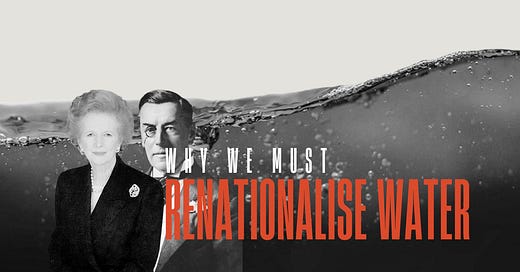In the 19th century, the UK's water provision was a hodgepodge, predominantly comprising privately owned and operating waterworks. This system transitioned towards local governmental control as the century progressed, responding to a recognition of water's essential role in public welfare. This move was driven by conviction, voiced by figures like Victorian statesman Joseph Chamberlain, that private profit motives could not be reconciled with the public's right to water. Chamberlain's 1884 critique of privatisation underscores a tension that has only intensified. It is difficult, if not impossible, to combine the citizen's rights and the interests of private enterprise because the private enterprise aims at its natural and justified objective, the biggest possible profit. This historical backdrop sets the stage for the privatisation saga of the late 20th century.
Margaret Thatcher, driven by dogma, privatised this national asset. The UK is the only developed nation to have done so, before and since. She told a sceptical nation in 1989 of the promised benefits of competition and better water.
Over 30 years after the privatisation of water utilities in England and Wales, the venture appears not only as a failure but as a veritable rip-off. Private equity's involvement has particularly drawn ire, with firms leveraging companies like Thames Water with unsustainable debt levels, ostensibly to maximise returns, but leaving them teetering on the brink of financial ruin, while chronically underinvesting in infrastructure.
Critics point to Thames Water's alarming £16 billion debt and the meagre £500 million shareholder contribution towards the required £1.5 billion turnaround as emblematic of a system in distress. This debacle cast Thames Water as the unacceptable face of Britain's utility privatisations, a sentiment echoed across the political spectrum, fuelling calls for renationalisation.
Massive shareholder dividends, rising cost to the consumer, pollution of the nation's rivers, all while delivering a poorer service. These critiques often conflate two distinct issues: the precarious financial state of some firms and the systemic underinvestment in infrastructure. The story around Thames Water's current debt crisis is emblematic of the broader industry woes, corporate greed and the consequence of regulatory shortcomings.
The pollution pervading the rivers across the United Kingdom presents a dire image of environmental vandalism, shareholder greed, and government neglect, with the release of untreated sewage by water companies, accountable for 35 percent of all pollution in English rivers, evidencing UK regulatory bodies' failure to act.
The frequent dumping of untreated or partially treated wastewater into our rivers, a practice that shockingly resulted in 400,000 instances in 2020, according to the World Wide Fund for Nature, has led to perilously high levels of E. coli bacteria. This includes the stretch of the River Thames used for the annual Oxford to Cambridge boat race.
Alarmingly, recent tests have revealed E. coli levels of up to 10 times higher than what is deemed acceptable, meaning that it is now officially unsafe to swim in any English river. When water was privatised, OFWAT, the industry's regulator, was supposed to be the consumer's eye on the industry. But 30 years of its regulation has now shown it to be toothless in protecting this vital utility.
The regulator's conservative approach to investment has stifled necessary spending on infrastructure. This has left England grappling with outdated facilities, insufficient reservoirs to meet the demands of climate change and population growth, and a water system that both leaks water and sewage into the natural environment.
These regulatory and financial shortcomings have tangible effects. We can see this in what has been washed up on Britain's shores: sewage, prompting mounting public outcry for cleaner water. This crisis demands a re-evaluation, not only of the privatisation model but of the regulatory framework that has failed to safeguard the public's need for a sustainable, efficient, and equitable water supply.
Not much to ask in a country blessed with abundant rainfall. As discussions veer towards nationalisation as the only solution, the broader story of water privatisation in England underscores a fundamental truth: Water is not merely a public good, but an essential necessity, one ill-suited to the whims of market forces and the pursuit of profit. It should be held by us all, truly as a trust. The alarming revelation that record levels of sewage are being pumped into England's rivers is not only an environmental catastrophe. It's a public health crisis that demands immediate and decisive action. The silence from the current government on this matter is both deafening and unacceptable.
The crisis facing England's water system, a crisis of underinvestment, regulatory inadequacy, and environmental degradation, calls for a re-evaluation of the very foundations upon which our water services are built. The final twist here is the revelation that Scottish water is cleaner and more affordable than English water.
Why? Because it was never privatised. Amid soaring bills and surging profits for the privatised water companies, the call for nationalisation resonates strongly across the UK, with the majority of Britons, including Conservative voters, advocating for essential utilities like water to be operated in the public sector.
Notably, 63 percent believe the water industry should return to public ownership, a sentiment even shared by 58 percent of Conservative voters, according to a YouGov poll in 2022. This highlights a widespread desire for a shift away from privatisation, underlining the public's preference for central services to be operated for the public good, rather than private profit.
Put simply, nationalising water is a vote winner. Nationalisation is the only pragmatic response to this failed experiment. Then, responsibility must fall to the incoming Labour government. Starmer must put water nationalisation as a key pledge in his manifesto. Such a move would not only rectify the systemic failings that have led to the current crisis but would also align with a broader commitment to the public interest, consumer protection, and environmental stewardship. Some goods are too essential to be left to the market. Nationalising the water industry is more than a policy decision. It's a commitment to doing right by the country, the public, the consumer, and the rivers that cradle our ecosystems.















Share this post